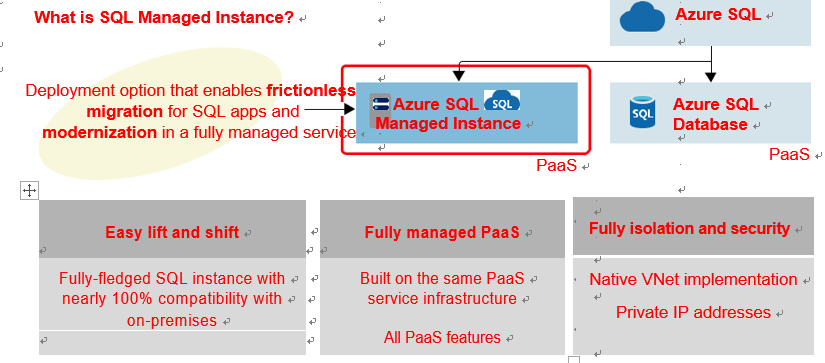Managed Instance and SQL Server on Azure Virtual Machines
As you navigate the transition from on-premises SQL Server environments to the cloud, you have two distinct pathways within the Azure ecosystem, each offering a unique blend of features and control levels: Azure SQL Managed Instance and SQL Server on Azure Virtual Machines.
Azure SQL Managed Instance is for those seeking to lift-and-shift their existing SQL work-loads directly into the cloud without extensive reconfiguration. It is a bridge between the con-venience of a fully managed PaaS and the familiarity of an on-premises SQL Server instance; therefore, it offers a swath of SQL features you’ve come to rely on, paired with the perks of a managed service.
SQL Server on Azure Virtual Machines caters to those demanding the utmost flexibility and control. This IaaS solution is akin to a canvas, providing the full SQL Server instance and the freedom to manage every aspect, from the operating system to the data platform, and mirror-ing the experience of an on-premises server but within Azure’s scalable environment.
In this section, we will delve into the details of each service, dissecting their architectures, use cases, and the rich tapestry of features they offer. Whether your priority is seamless man-agement or granular control, these Azure services will meet your business needs with precision and efficiency, propelling you into the future of cloud-based data management.
Managed Instance
Azure SQL Managed Instance is a deployment option of Azure SQL that bridges the gap between an on-premises SQL Server instance and the Azure cloud platform. It offers full com-patibility with the SQL Server engine, enveloped in a fully managed PaaS offering and provid-ing a “best-of-both-worlds” approach to database management.
This service provides a highly available, scalable, and secure SQL Server environment with-out the overhead of managing the underlying infrastructure. It does so by encapsulating the SQL Server instance in a fully managed Azure environment, thus offloading typical infrastruc-ture responsibilities such as patching, backups, and high availability to Azure’s automated services.
Azure SQL Managed Instance is built on an isolated and dedicated subnet within Azure Virtual Network, which allows for secure connectivity from your on-premises network to Azure via ExpressRoute or VPN Gateway. It’s essentially a private cluster of resources that Azure provisions and manages for you. Figure 2-25 outlines the key benefits of Azure SQL Managed Instance.
50 CHAPTER 2 Identify considerations for relational data on Azure

FIGURE 2-25 Azure SQL Managed Instance

Leave a Reply